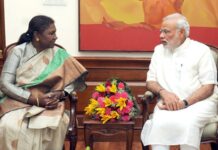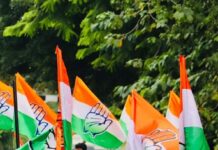New Delhi (IANS): India will begin voting Monday in a staggered national election widely tipped to give a decisive edge to a confident BJP, led by Hindutva mascot Narendra Modi, which may however still fall short of a parliamentary majority.
It will be the world’s biggest democratic exercise, involving a staggering 814 million voters – of which about 120-150 million will be first-time voters – across the length and breadth of the seventh largest country, who will cast their votes in 930,000 polling booths to choose from hundreds of candidates – nominations are still being filed — and dozens of political parties, big and small.
Although fingers are still crossed on whether the BJP-led National Democratic Alliance (NDA) will secure a majority in the 545-member Lok Sabha, the House of People in the Indian parliament, most agree that it has outpaced a bruised Congress and its shrunken United Progressive Alliance (UPA) that ruled India for ten years since 2004.
Ranged against both these groupings are a string of regional parties with devoted pockets of support such as the Samajwadi Party and the Bahujan Samaj Party (Uttar Pradesh), Biju Janata Dal (Orissa), the AIADMK (Tamil Nadu) and the Trinamool Congress (West Bengal) which could play a key role in the event of another hung parliament.
The Bharatiya Janata Party is supremely confident of returning to power that it lost a decade ago. “We are very sure that the BJP on its own will win up to 250 seats,” spokesperson Prakash Javadekar told IANS. “Along with our allies in NDA, the tally is sure to touch 290 or so.”
The Congress is harping on the theme that doomsayers will be proved wrong again – as it happened during the last two Lok Sabha elections.
“We are not prophets or astrologers. All I can say is that the UPA will surprise everyone as it did both in 2004 and 2009,” spokesperson Abhishek Singhvi of the Congress told IANS. “With our known allies and a few others, we will easily form the government.”
Most pollsters and political pundits don’t agree with Singhvi. But they also say that the BJP and its allies are unlikely to get past the half way mark of 272 seats and dismiss the widely talked about “Modi wave” as a largely urban phenomenon promoted by sections of the electronic media.
Political analyst Pradip Dutta admitted that the BJP “obviously has a much larger lead over the Congress” but added that the BJP might not win 272 seats on its own.
“I don’t see a Modi wave, and the BJP should not take its victory for granted,” Dutta told IANS. He said that the BJP, if it finishes on top of a hung parliament, could attract more allies.
Another political analyst, Badri Narayan Tiwari, was more emphatic. “The BJP won’t get a clear majority,” Tiwari told IANS on telephone from Allahabad where he is an academic. “They will have to woo more parties if they have to form a government.”
Whatever the outcome, Lok Sabha Election 2014 is a unique battle, one reason being Modi, still the Gujarat chief minister. In less than a year since he was made chief of the BJP election campaign, leading to his later elevation as the party’s prime ministerial candidate amid some misgivings within the party, Modi has grown larger than life into a figure who is both venerated and reviled like few other politicians in India.
In some ways, the 63-year-old has turned the election into a show largely revolving around him, hoisting his aggressive persona on a party which for decades believed in collective leadership, and making subtle attempts to shed his Hindu hardliner image without giving up Hindutva, or Hindu nationalist, politics.
This, analyst Tiwari said, was the BJP’s strength – and weakness.
With a proven track record of governance in Gujarat, Modi has without doubt connected with a large mass of middle class Indians, frustrated by a stuttering economy and lack of jobs, denouncing the Congress and other political foes, often using language his own colleagues may not be comfortable with.
However, he remains a divisive figure for many, having presided over the Gujarat anti-Muslim riots of 2002 for which he has never offered any apology.
On Monday, five of the 14 Lok Sabha constituencies in Assam and one of the two in Tripura, both in the northeast of India, will see polling. It will be followed by Delhi and some heartland states on April 10. Seven more rounds of voting will follow until May 12. The millions of votes will be counted May 16 to reveal the mind of the Indian electorate about who will govern India for the next five years.














